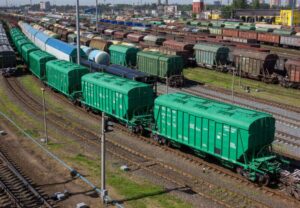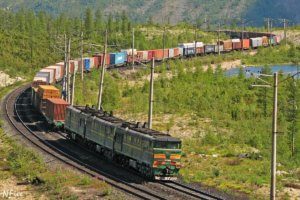
The Supervisory Board of Ukrzaliznytsia JSC (UZ) has approved the indexation of freight transportation tariffs, the company’s press service reports.
“Tariffs for rail freight transportation have not been indexed for almost two years – since the summer of 2022, and the previous indexation did not bring tariffs to an economically justified level. During this time, the producer price index for industrial products has already reached 176.4%. At the same time, the railroaders proposed to limit the indexation of tariffs to a much more moderate figure: only 37%, or about 13% per annum, given that 2.5 years have passed since the last indexation,” the press service said.
It is noted that the proposals to increase tariffs were approved by the board of UZ on December 5, 2024.
The approved changes will be further submitted for consideration by the Tariff Council under the Ministry of Communities and Territories Development of Ukraine, UZ said.
The company reminded that according to the Cabinet of Ministers Resolution No. 1392 of December 16, 2009 “On Ensuring Transparency of the State Tariff Policy for the Transportation of Goods by Rail within Ukraine”, tariffs for the transportation of goods by rail within Ukraine should be indexed annually.
“Unfortunately, this rule was not regularly implemented and the dynamics of indexation of tariffs for rail freight transportation lagged far behind changes in prices for the main resources consumed by the railroad,” UZ said, recalling that tariffs for rail freight transportation had not been indexed for almost two years – since the summer of 2022, and the previous indexation did not bring tariffs to an economically justified level. During this time, the producer price index for industrial products has already reached 176.4%.
Since the last revision of freight transportation tariffs, electricity prices have increased by 166%, diesel prices by 110%, spare parts for diesel locomotives by 217%, spare parts for electric locomotives by 22%, bearings by 37%, and solid-rolled wheels by 20%.
It is noted that this deprived the company of the opportunity to repair infrastructure and rolling stock to the required extent, as well as to index the salaries of railway workers, of whom more than 10 thousand are defending Ukraine in the ranks of the Armed Forces, and to fulfill social obligations to them.
“The indexation of freight transportation tariffs is vital for the Ukrainian railways to operate sustainably and meet safety standards. The level of tariff indexation was calculated to be at least sufficient to finance operating expenses and carry out critical infrastructure repairs,” the press service of Ukrzaliznytsia quoted Hafer Cheetah, chairman of the company’s supervisory board, as saying.
It is reported that the planned indexation will make it possible to finance the repair of rolling stock and infrastructure at the minimum required level. Otherwise, there will be significant risks to the continuity of the safe operation of the state’s critical infrastructure.
Oleksandr Pertsovskyi, Chairman of the Board of Ukrzaliznytsia, promised to openly present and explain to customers the changes in the upcoming freight tariffs.
“We will openly present and explain the indexation proposals to our customers, both the largest and smaller shippers from all sectors of the economy, and will also fix with them what compensations and operational improvements they expect from Ukrzaliznytsia,” the press service quoted the chairman of the board of Ukrzaliznytsia as saying.
He emphasized that the railroad continues to deliver cargo reliably despite daily shelling and is restoring track and power infrastructure as soon as possible to avoid letting customers and the entire Ukrainian economy down.
“At the same time, we owe a significant debt to the railroad workers themselves – their salaries are significantly lower than the industry average, and a number of social benefits have been suspended. Indexation of tariffs is critically necessary to ensure that the working conditions of railway workers do not deteriorate,” Pertsovsky said.
Earlier it was reported that the Tariff Council under the Ministry of Community Development, Territories and Infrastructure (MiRD) approved the draft decision on the unification of tariffs for freight transportation by rail.
As reported, Ukrzaliznytsia and representatives of Ukrainian business are working together to unify the tariff setting system for rail freight transportation proposed by Ukrzaliznytsia starting in October 2022.
Former Ukrzaliznytsia CEO Yevhen Lyashchenko said in an interview that without unification, the company would not be able to end the year with a profit. According to him, the company’s plan for 2024 is not to increase freight tariffs but to harmonize them. This implies a complete change in the model of their calculation by simplifying the tariff system, which consists of five different classes and more than 20 coefficients. The proposals include a single tariff for the transportation of empty wagons and a division into classes linked to transportation technology.
According to preliminary estimates, the harmonization of tariffs should bring the company an additional UAH 3-4 billion by the end of the year, depending on when the government approves this decision.

Ukrainian producers of construction materials are concerned about a rise in Ukrzaliznytsia tariffs on freight transportation, the Association of Construction Materials Producers of Ukraine has said.
“In an internal instruction the Infrastructure Ministry has made public its intention to double the tariff for empty freight cars. While tariffs are rising it is impossible to transport construction materials via Lviv Railways… Freights are overcoming a distance of 150 kilometers for six to seven days,” reads the association’s statement.
In turn, Director General of Kovalska Group (based in Kyiv) Serhiy Pylypenko said that failures in Ukrzaliznytsia’s work lead to delays in construction
“Kovalska has to receive over 200 cars of raw materials per day… Due to Ukrzaliznytsia’s awkward management we are forced to delay the supply of construction materials which consequently impacts timely completion of construction activities,” he said.
Pylypenko added that overall costs of services provided by freight transportation companies grew by 60% over eight months in 2018. In particular, Ukrzaliznytsia increased tariffs on freight transportation by its own cars in July.
“In addition, Ukrzaliznytsia virtually does not have multipurpose rolling stock for the transportation of inert materials. Thus producers [of construction materials] have to use other types of cars (for cement, grain, and minerals) and pay extra fees for them in the form of a 20% tariff increase. Moreover, Ukrzaliznytsia’s shortage in locomotives is 130-150 units per day, while freight delivery time is longer by 2-10 days,” Pylypenko complained.